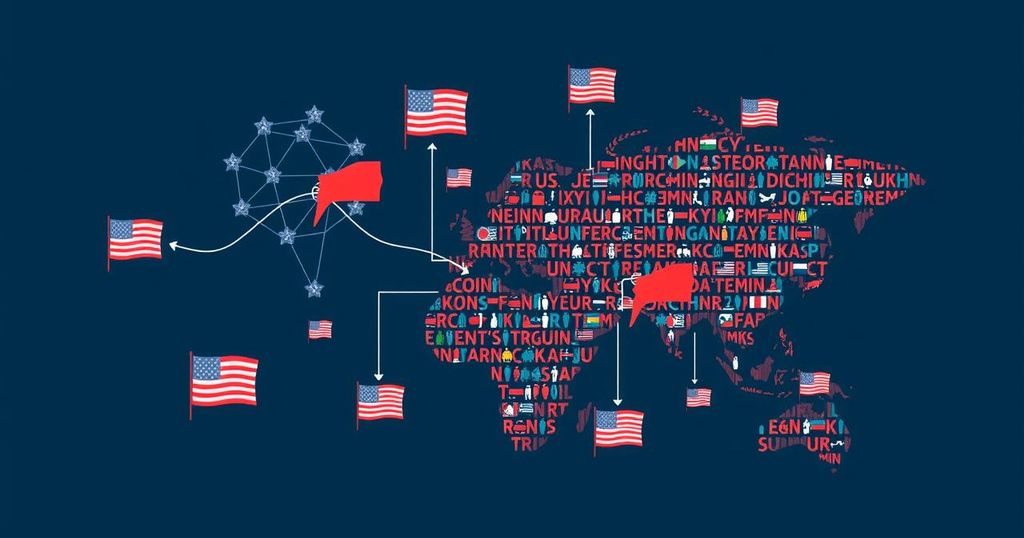The upcoming U.S. presidential election will have far-reaching implications for global relations, encompassing military support, trade policies, climate change initiatives, and immigration. Each candidate presents unique challenges and opportunities for international engagement, making the election a pivotal moment in shaping America’s foreign policy.
The upcoming United States presidential election holds profound implications not just domestically but also across the globe. The choice between Vice President Kamala Harris and former President Donald J. Trump will influence international relations, conflict dynamics, economic policies, and environmental strategies. Each candidate presents a distinct path for America’s role as a superpower, eliciting varied responses from different nations. In Israel, public sentiment leans towards Trump, with many Israelis viewing him as a supportive ally, particularly on matters concerning Iran and the Israeli-Palestinian conflict. However, regardless of the outcome, the prospects for Palestinian statehood appear dim, as Israeli society remains increasingly opposed to such solutions, rendering U.S. influence limited. Harris may advocate for dialogue and a cease-fire, albeit without drastically altering military support to Israel. For Ukraine, the stakes are high, particularly concerning continued U.S. support against Russian advances. Ukrainians express apprehension at the prospect of a Trump administration, fearing that it may impose unfavorable peace terms. In contrast, Harris is expected to sustain military assistance. Russian President Vladimir Putin perceives less differentiation between the two candidates, believing both would be less committed to Ukraine than Biden was, and he publicly supports Harris as someone he could negotiate with. The implications for U.S.-China relations also remain salient, with both candidates likely to adopt a hawkish stance. Trump’s history of advocating for tariffs on Chinese imports causes concern among Chinese economic officials, while others in Beijing speculate that Trump’s less vigorous commitment to alliances might favor their position globally. Harris is anticipated to pursue a more cohesive approach with allied nations in the Asia-Pacific, which could further isolate China. Europe stands at a crossroads, with diverse opinions regarding Trump’s potential return. While some nationalist movements may rally around him, many European leaders fear his economic policies, such as proposed tariffs and NATO withdrawal, which could destabilize transatlantic alliances. Conversely, a Harris victory may prompt a shift towards bolstered European self-reliance amid ongoing global challenges. On the topic of global trade, Trump has expressed a stark preference for tariffs, a policy that could provoke widespread repercussions, including trade wars and economic downturns. Harris’s intention would likely lean toward maintaining strategic tariffs for national security while avoiding the more drastic measures proposed by Trump. In Africa, perceptions of the candidates diverge, with some seeing Trump as a decisive leader despite his previous disparaging remarks about African nations. Harris’s ties to Africa resonate positively, particularly given her ancestral connection. The impact of U.S. climate policies under either candidate could profoundly affect the global fight against climate change, with Harris favoring an approach aligned with renewable energy and emissions reductions while Trump may reverse many environmental protections established during the Biden administration. Lastly, the U.S.-Mexico relationship will remain contentious regardless of the election outcome. Mexico anticipates stricter immigration policies and potential tariffs that could strain bilateral ties, particularly should Trump assume office. In essence, the 2024 U.S. presidential election encapsulates a referendum on global leadership. The candidates’ policies on military support, economic engagement, and climate change will reverberate through international corridors long after the votes are counted. Thus, the election not only defines America’s future but also outlines the geopolitical order for nations worldwide.
The upcoming U.S. presidential election is of paramount importance, as it shapes America’s future stance as a global superpower and its interactions with other nations. The starkly contrasting political ideologies between the candidates present varied futures for international relations, especially in areas such as the Middle East, Eastern Europe, Asia, and the global economy. A comprehensive examination reveals how the election’s outcome may drastically affect issues ranging from military alliances and trade policies to climate initiatives and immigration dynamics.
The outcome of the U.S. presidential election carries significant global repercussions that extend beyond American borders. As the world watches, the choice between Kamala Harris and Donald Trump encapsulates various international interests, including military support, trade relations, and climate initiatives. Each candidate’s vision will shape not only U.S. policy but also influence how other nations navigate their foreign relations, economic strategies, and efforts to combat climate change. The results of this election are a defining moment for international dynamics in the years to come.
Original Source: www.nytimes.com






